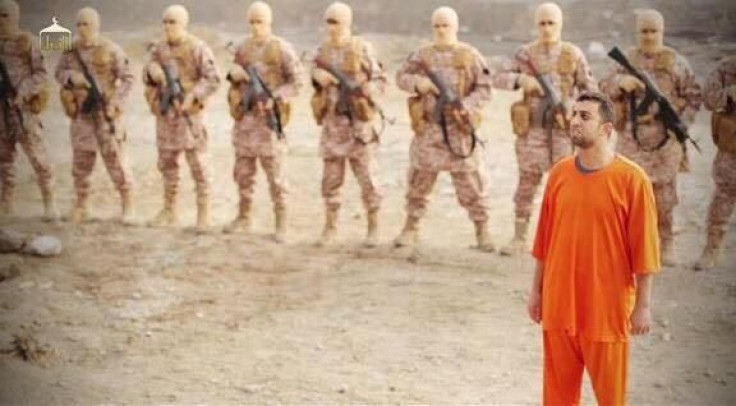Jordanian Pilot Mu'ath Al-Kaseasbeh Purportedly Burned Alive In New ISIS Video

The Islamic State group says it has burned Jordanian air force Lt. Mu'ath Safi al-Kaseasbeh alive, after days of negotiations with Jordan to secure his release. Al-Kaseasbeh, 26, was an F-16 pilot captured after his plane crashed on a mission for the U.S.-led coalition against the extremist group.
The group also known as ISIS released a video Tuesday titled “Healing of the Believers’ Chests” that included gruesome footage from al-Kaseasbeh’s purported execution. Stills from the video were widely circulated on ISIS-affiliated Twitter accounts. International Business Times has chosen not to display the video, whose authenticity could not be verified independently.
It opens like many of ISIS’ past video releases with news outlet footage. This particular video shows footage of King Abdullah II of Jordan explaining that all of the country’s military pilots volunteered to join the anti-ISIS coalition. Al-Kaseasbeh is then forced to read a prepared speech, detailing the origin and quantity of coalition fighter jets that are targeting Raqqah.
The narrator blames al-Kaseasbeh's death on Jordan’s involvement in the anti-ISIS coalition. Jordan is one of roughly 60 countries, with varying degrees of involvement, members.
The video shows a man, suspected to be al-Kaseasbeh, in a cage surrounded by alleged ISIS members clad in beige army fatigues and beige masks. There is a line of what appears to be fuel leading up to the man, whose orange jumpsuit also appears to have been drenched in fuel. The line of fuel is then set aflame.
Al-Kaseabeh was captured in late December when his warplane crashed near the Islamic State’s headquarters in Raqqa, eastern Syria. The Jordanian military confirmed that he’d been captured, and Jordan called for his immediate release.
Following a series of failed ransom negotiations for two Japanese hostages, who were also murdered, ISIS asked for the release of suspected suicide bomber Sajida al-Rishawi, imprisoned in Jordan, in exchange for al-Kaseasbeh. Jordan said it was willing to comply but demanded proof that the pilot was alive before agreeing to the prisoner exchange. Jordan said it had not received any news of al-Kaseasbeh’s fate.
© Copyright IBTimes 2024. All rights reserved.












